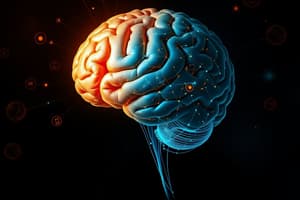Podcast
Questions and Answers
What does the prefix 'intra' in intrapsychic differentiation refer to?
What does the prefix 'intra' in intrapsychic differentiation refer to?
- Outside
- Related to others
- Among or between
- Within (correct)
Self-concept is static and unchanging.
Self-concept is static and unchanging.
False (B)
What plays a crucial role in influencing our self-awareness according to cognitive processes?
What plays a crucial role in influencing our self-awareness according to cognitive processes?
Perception, interpretation, and memory
The prefix 'inter' in interpersonal differentiation means __________.
The prefix 'inter' in interpersonal differentiation means __________.
Match the type of differentiation with its description:
Match the type of differentiation with its description:
What does the 'Ideal Self' refer to?
What does the 'Ideal Self' refer to?
The 'I' self refers to one's past experiences and social feedback.
The 'I' self refers to one's past experiences and social feedback.
What concept does the Global model emphasize in relation to the self?
What concept does the Global model emphasize in relation to the self?
The _____ self represents a cohesive identity that integrates various aspects of the self into a harmonious whole.
The _____ self represents a cohesive identity that integrates various aspects of the self into a harmonious whole.
Match the theorists with their respective concepts of the self:
Match the theorists with their respective concepts of the self:
Flashcards are hidden until you start studying
Study Notes
The Self as a Cognitive Construction
- Our self-awareness is constantly influenced by cognitive processes like perception, interpretation, and memory.
- Our self-concept is flexible and changes as we incorporate new information and reinterpret our experiences.
Differentiation of Self by Bowen
- Intrapsychic Differentiation refers to the ability to distinguish our thoughts from our emotions.
- Interpersonal Differentiation refers to the ability to distinguish our experience from the experiences of those we are connected to.
Carl Rogers’ Self Theory
- Real Self refers to one’s current identity.
- Ideal Self refers to the person someone wants to become— the best version of themselves.
David Lester’s Theory
- Multiple Selves: People can exhibit different identities or behaviors in various situations or roles.
- Global Model: Refers to how traits, values, and self-concept remain consistent across different situations.
- Unified Self: Refers to a cohesive identity that integrates various aspects of the self into a harmonious whole.
Donald W. Winnicott’s Theory
- True Self: Represents the authentic and innate qualities of an individual.
- False Self: Refers to a protective persona formed in response to external pressures, expectations, or traumas.
The Self as a Proactive and Agentic
- Proactive Behavior: Refers to self-initiated behavior aimed at addressing problems before they arise.
- Agentic Behavior: Refers to the ability to control one’s goals, actions, and destinies.
Core Properties of Human Agency
- Intentionality: Individuals can exhibit different identities or behaviors in various situations or roles.
- Forethought: Refers to thinking ahead and planning actions based on expected outcomes.
- Self-Reactiveness: Refers to monitoring and evaluating one’s own behavior and emotions.
- Self-Reflection: Refers to rewarding or adjusting behaviors based on self-evaluation and feedback.
Human Agency
- Underscores that individuals actively shape their actions, thoughts, and environments.
Studying That Suits You
Use AI to generate personalized quizzes and flashcards to suit your learning preferences.




